Iranian Condensate Cargo Expected To Discharge In Venezuela
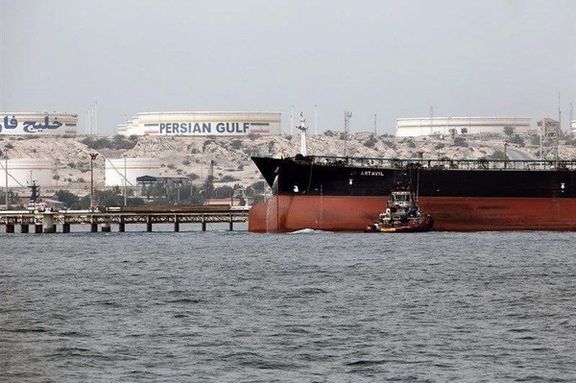
A cargo of Iranian condensate intended for Venezuela, the fourth delivery this year, will discharge in coming days at the country's main oil port, a Venezuelan lawmaker said on Thursday.

A cargo of Iranian condensate intended for Venezuela, the fourth delivery this year, will discharge in coming days at the country's main oil port, a Venezuelan lawmaker said on Thursday.
Iran last year began providing the Venezuelan state-run oil company PDVSA with condensate that is used to make the South American nation's extra heavy oil exportable. This year, PDVSA and the National Iranian Oil Company (NIOC) signed a swap deal that formalized the exchange of Venezuelan crude for Iranian condensate.
The swaps, occurring amid US sanctions on both nations and their oil industries, have allowed PDVSA to ramp up crude output this autumn to levels close to those of early 2020.
"Two million barrels of diluent have just arrived. Where? - from Iran," said Angel Rodriguez, a lawmaker from President Nicolas Maduro's socialist party.
Washington imposed trade sanctions on PDVSA and its subsidiaries in 2019 as a way to oust Maduro after it called his re-election a sham. The measures barred exports to the United States, which used to buy most of Venezuela's crude.
PDVSA has adapted to the measures by finding new customers and ways to ship its crude and refined products to countries including China.
Iran has delivered some 4.8 million barrels of condensate to PDVSA and its joint ventures this year and has also supplied it with gasoline. It has received in return at least 5.8 million barrels of Venezuela's Merey 16 heavy crude and jet fuel.
Report by Reuters
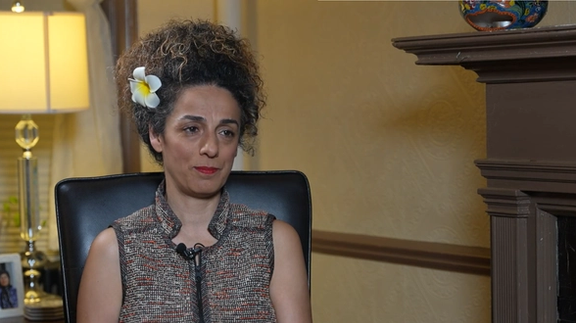
Masih Alinejad, an Iranian activist says that she would join two US Senators introducing a law named after her, aimed at Iran’s “transnational terror campaign.”
No details of the legislation proposed by Democrat Ben Cardin and Republican Pat Toomey have been published. It may propose additional sanctions against Iran just as diplomats in Vienna are working to revive the 2015 agreement limiting Iran’s nuclear program.
Alinejad, a best-selling author based in New York, was reportedly the target of an Iranian plot to kidnap her and take her to Iran via speedboat to Venezuela. A vocal supporter of strong US measures against the Islamic Republic, Alinejad has accused the Biden administration of ignoring human rights violations by Iran for the sake of reviving the 2015 nuclear deal, the JCPOA (Joint Comprehensive Plan of Action) nuclear program.
Alinejad was contacted by US Secretary of StateAntony Blinken after an interview with CNN in July in which she requested a meeting with President Joe Biden. In 2019 Alinejad had a well-publicized meeting with President Donald Trump’s Secretary of State Mike Pompeo.
Blinken said that the US would “support the indispensable work of independent journalists around the world,” and would not “tolerate efforts to intimidate them to silence their voices.”
Alinejad tweeted a readout of the call saying Blinken had found the idea that Tehran would abduct her from the US “particularly egregious.” She added Blinken had assured her the Biden administration would hold Iran accountable for the alleged plot.
The US Justice Department announced July 13 that four Iranian nationals were indicted on charges of conspiracies related to kidnapping, sanctions violations, bank and wire fraud, and money laundering, and a co-conspirator was facing additional structuring charges. One of the Iranians awaits trial in the US.
Although the Justice Department statement stressed that an indictment did not establish guilt and specifically avoided names, Alinejad announced she had been targeted for abduction along with other journalists from Canada and the United Kingdom and the Federal Bureau of Investigation (FBI) had protected and monitored her home for months.
Dozens of Iranian journalists in other countries, including those working for BBC Persian TV and London-based Iran International TV, repeatedly complain about their own and their family members' harassment in Iran, and say they had been warnedby authorities about possible actions.
Iran executed in December 2020 Rouhollah Zam, editor of a social-media channel, after he was kidnapped in Iraq and convicted on security charges and televised confessions, without due process of law.
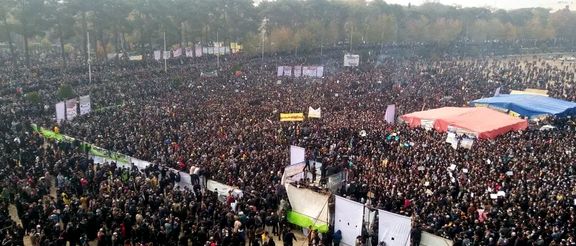
Authorities in Iran’s central city of Esfahan have warned residents not to gather for “any illegal protest” on Friday and threatened to use force.
Protests by farmers from the regions around the city in November by the government used riot police to disperse them last week from a makeshift camp on the dry riverbed of Zayanbeh Roud in the city center. Farmers were demanding their water share for irrigation.
The following day thousands of residents tried to gather to protest and were met with special riot police who used shotgun ‘bird shots’ to shoot at demonstrators, injuring dozens, including around 20 people who lost one or both eyes.
Residents have called for a repeat protest for Friday, December 3, and the authorities have said that any person protesting would be considered aiding anti-Islamic Republic opposition groups.
The traffic police chief in the city has announced all roads along the river will be closed to cars and pedestrians from 5:00 am on Friday. Esfahan’s governor said no one submitted a request for a permit to protest and any gathering will be illegal.
Islamic Republic officials never issue a permit for any protest deemed to be against the regime.

In a fiery speech Thursday, the commander of Iran’s Quds Force told the United States in case of the slightest move, “your teeth will be crushed in your mouth.”
Esmail Ghaani (Qaani) who was speaking in a gathering to honor those killed in Iran’s operations in the region, said, “We are telling the Americans you have still time to leave the region in humiliation, or you will be expelled in a manner worse than in Afghanistan.”
The Quds (Qods) Force is Iran's extraterritorial military and intelligence army, controlling its proxies in regional countries, distributing weapons cash and military technology to militant groups. Its previous commander Qasem Soleimani was killed in a US drone attack in Baghdad in January 2020.
Praising Afghan militiamen and Iranian forces killed in the region, mainly in the Syrian civil war, Ghaani told “the resistance front” to continue their fight under the banner of Iran’s Supreme Leader Ali Khamenei.
The ‘resistance front’ or ‘resistance forces’ are terms the Islamic Republic uses to refer to its proxy forces, including the Lebanese Hezbollah, Shiite militia it backs in Iraq, forces fighting under its command in Syria, militant Palestinian groups and Yemen’s Houthis.
Ghaani declared that since the time Palestinians followed the “martyrdom” path of Iranians they became more and more powerful. He cited the missile war earlier this year and praised Palestinian militants for firing 3,000 missiles at Israel. He ridiculed Israel that it cannot respond against Iran, claiming that a threat during the 2006 Israeli war against Hezbollah in Lebanon was not carried out.
What sounded as potentially provocative for the region’s Sunni Arab states, Ghaani said that current conditions in the Islamic world are right for the spread of Shiite rule.
He addressed the United States saying, “The time when you did whatever you wished, and no one could say anything is over. The time of hit and run is over. Now if you hit you will be hit back all the way to the end.” He again brought up the US withdrawal from Afghanistan and said, “You fought in Afghanistan for 20 years and what did you accomplish?”. He added that Americans escaped from Afghanistan and could not even evacuate their own people.
Ghanni declared that the US withdrawal from the region has been partly achieved and the ‘resistance front’ will continue its fight.
He concluded by saying, “For years America spoke of overt and covert sanctions, but Iran’s power in hardware and software has reached a level that you know if you make a move “your teeth will be crushed in your mouth.”
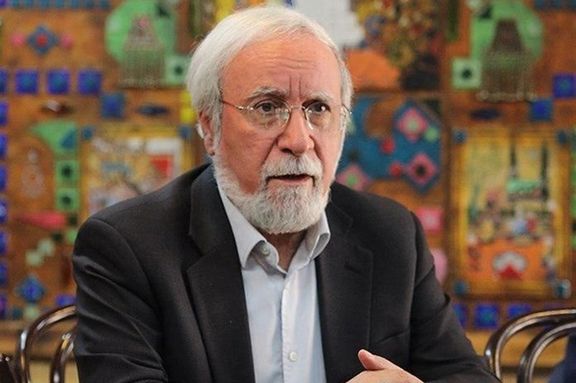
Sabah Zanganeh a former diplomat and a relative of Iran’s Supreme Leader has said in an interview, "The mood is positive, let's talk with America face to face."
This was one of the rare optimistic views coming out of Iran in recent days about the nuclear negotiations in Vienna. Most political analysts are not optimistic about the likelihood of Iran and the United States returning to their commitments under the 2015 nuclear deal known as JCPOA.
Zanganeh, a relative of Supreme Leader Ali Khamenei through marriage, told the reformist Arman newspaper that the general atmosphere in Vienna shows that there is an increasingly positive trend which makes reaching a result more likely. "The fact that the new Iranian negotiators have come to the conclusion that they need to accept the previous six rounds of the nuclear talks as a basis for the current round of talks is a positive step," he said.
The former diplomat added that America's withdrawal from the nuclear deal caused big economic losses for Iran. "There will be more losses if the current situation continues," Zanganeh added that the two sides need to tweak their positions in a way that would lead to the lifting of sanctions imposed on Iran.
Asked if the situation is ripe for lifting the sanctions, Zanganeh said, "There is evidence indicating the Americans have accepted to lift JCPOA-related sanctions. Of course, the priorities for lifting the sanctions have not been determined yet." He added: "On the other hand, it is not clear what would the United States demand against lifting the sanctions and how would Iran react to those demands."
Generally, Zanganeh concluded that based on assessments made about the first two days of the negotiations, reaching results during a short period is likely if the United States and the European countries show goodwill. However, he acknowledged that while the US insists on direct talks with Iran, the Iranian delegation is still adamant that the talks should take place collectively and in the presence of other JCPOA member states.
Meanwhile, he noted that the only country that is against direct talks between Iran and America is Israel, although there might also be opposition among Arab states. The opposition might attempt to obstruct the direct talks, but both Iran and the United States need to tackle possible opposition delicately and not allow pressures from outside to affect the talks.
Zanganeh also noted that Iran has rejected the United States' call for extending some of JCPOA restrictions or imposing new limitations on Iran's nuclear program. He added that Iran will not accept the United States' demand for lowering uranium enrichment level to what was agreed in JCPOA. However, he said that Iran will accept the demand only if a proportionate reduction is made in US sanctions. Tehran also wants the United States and Europe to guarantee that Washington will not leave the agreement again.
Zanganeh also called on Iranian hardliners who have been denying the impact of sanctions on the country’s economy should change their approach and understand the reality that Iranians are calling for lifting economic pressure that has led to hardship for the great majority of the people with ordinary incomes.
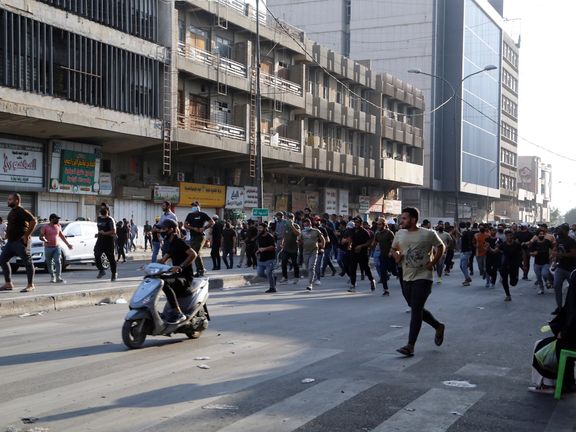
Protesters in Baghdad on Wednesday rejected the final results of Iraq's parliamentary elections, which were announced by the electoral commission a day earlier.
The protesters, mainly supporters of Shiite factions backed by Iran, continued to level unsubstantiated claims that the vote had been rigged.
"We will continue our protest until they change the results and bow to our demands," said protester Ali Jawad.
The electoral commission confirmed Shiite cleric Muqtada al-Sadr as the biggest winner in last month's poll, securing 73 out of Parliament's 329 seats.
A Sunni party headed by Parliament Speaker Mohamed al-Halbousi came in second with 37 seats, while the Kurdistan Democratic Party (KDP) secured 31 seats, the commission said.
The pro-Iran factions - which had alleged voter fraud - lost around two-thirds of their seats. They got only 17 seats, down from 48 in the previous elections.
The results will now be sent to the Federal Supreme Court for ratification, after which the president will call for a Parliament session within 15 days, where a new Speaker is elected.
AP report